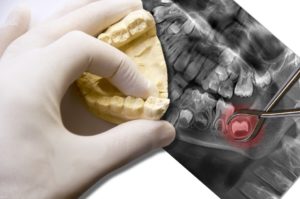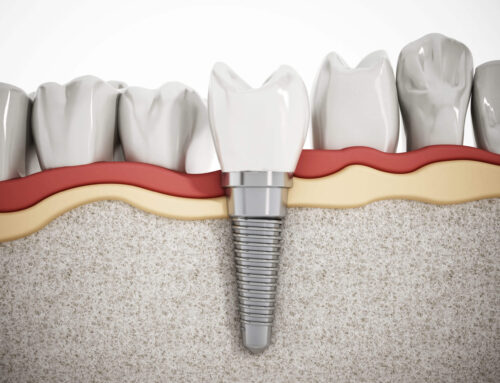Did you know your teeth were designed to last a lifetime? Yet, there’s an unfortunate reality that most of us aren’t able to keep all of our teeth for various reasons. And despite our noble intentions of practicing good oral hygiene and making routine dental visits, we could still lose teeth. In any case, when we cannot maintain our adult molars, AKA wisdom teeth, an oral surgeon will recommend dental extractions.
In fact, American dentists and oral maxillofacial surgeons pull a rough total of 10 million wisdom teeth annually!1 Which means it’s more common to lose adult teeth than maintain them. Why is this? Well, that may be for another article. In the meantime, let’s explore the top reasons behind patients having dental extractions.
-
Tooth Decay & Infection
Unfortunately, not everyone is inclined to taking great care of their teeth. Yet, there are those who do, however, but to no fault of their own end up with a problem tooth. A tooth that is partially exposed above the gum line, for example, may have decay that poses issues underneath the gums.  When a tooth is decaying in the mouth, sooner or later, an infection can set in. Then, after a while, you’ll typically experience pain and discomfort, bleeding gums, and/or develop fever behind the infection.
In any case, it’s prudent that you see an oral surgeon immediately without putting it off. If your tooth is in fact decayed and causing infection, then oral surgeons, like those from OMSH, can help. Under instances where patients have severe tooth decay, it becomes advantageous for an experienced dental practitioner to remove those teeth. Dental extractions can help alleviate the risk of further infection, as well as alleviate patient discomfort.
-
Impacted Molars
 For some adults, their jawline doesn’t grow long enough to provide space for all their molars (back teeth). In this situation, they have more teeth than gum space and some teeth remain trapped under the gums. Fortunately, many adults don’t experience an issue with these teeth and don’t need extractions. For others, though, these teeth become troublesome while trying to make their way out and emerge above the gum-line. And when those teeth have no room to emerge, they may begin to grow against other teeth. Consequently, for most people, this causes pain and alignment issues. Should other dental complications arise, your dental practitioner may need to remove the impaction.
For some adults, their jawline doesn’t grow long enough to provide space for all their molars (back teeth). In this situation, they have more teeth than gum space and some teeth remain trapped under the gums. Fortunately, many adults don’t experience an issue with these teeth and don’t need extractions. For others, though, these teeth become troublesome while trying to make their way out and emerge above the gum-line. And when those teeth have no room to emerge, they may begin to grow against other teeth. Consequently, for most people, this causes pain and alignment issues. Should other dental complications arise, your dental practitioner may need to remove the impaction.
-
Crowded Teeth
Similar to impactions, tooth crowding happens when your teeth above the gum-line grow out crooked and misaligned. In this case, oral surgeons will extract one or more teeth to allow the rest of your teeth to properly align. Crowded teeth typically grow out crooked or too big for your mouth. If a dental practitioner cannot correct the issue with braces, and other orthodontic treatments don’t offer an advantage, extraction may be necessary. Extractions ultimately allow for much-needed space along the gum-line where the remaining teeth can grow and straighten themselves properly.
-
Gum Disease & Cancers
Some people still don’t know that gum disease is the main cause of tooth loss. This happens when gums begin to pull away from teeth and leave open spaces where bacteria and debris can enter. Over time, this build-up of bacteria deposited in those open pockets between the teeth and gums begin to wreak havoc. As such, they start destroying our teeth, connective tissues, and dental bone.
Unfortunately, millions of adults deal with gum disease and must have dental extractions to prevent infection from becoming worse. Sometimes dental implants may offer a viable solution for missing teeth. But this is only an option where surgeons have helped restore gums, and if patients still have good bone density.
-
Dental Trauma or Accident
This goes without saying. Any form of trauma to the mouth where you fracture a tooth, or you sustain damage to your gums may require some extractions. In the delicate case of dental trauma, skilled dental surgeons will assess the damage and pull teeth in order to protect the rest of the mouth.
Oral maxillofacial surgeons, for example, specialize in administering anesthesia and performing reconstructive surgery to the face, mouth, and jawline. These unique practitioners are dually licensed and trained to perform both dental and medical facial surgeries.
Are you experiencing dental pain or discomfort? If so, it’s probably time for an oral exam. For patients in the Greater Houston area, contact OMSH for information or to schedule a consultation. Call us at (832) 509-4505.
Site References:






